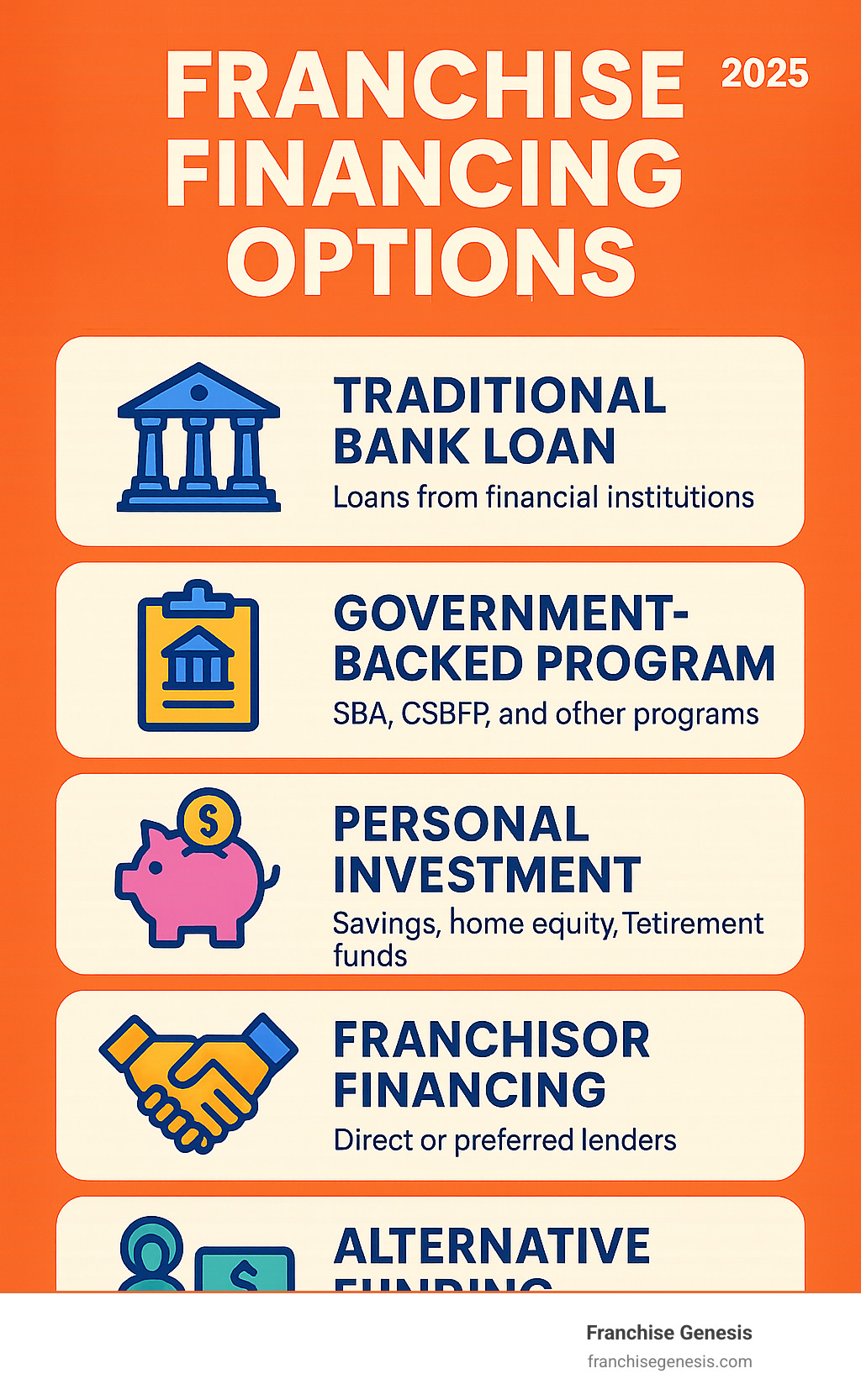Navigating Franchise Financing Options
When exploring franchise financing options, key avenues typically include:
- Traditional Bank Loans: Commercial loans, term loans, or lines of credit from financial institutions.
- Government-Backed Programs: Like the Canada Small Business Financing Program (CSBFP) or U.S. Small Business Administration (SBA) loans, which reduce lender risk.
- Franchisor Financing: Options like deferred franchise fees, direct loans, or connections to preferred lenders.
- Personal Investment: Utilizing your own cash, savings, home equity, or retirement funds (through programs like Rollovers for Business Startups – ROBS).
- Alternative Lenders: Online platforms offering quicker, but sometimes more costly, funding.
- Angel Investors: Individuals who provide capital in exchange for ownership equity.
- Friends and Family Loans: Often informal, but best formalized with clear agreements.
For business owners expanding their brand through franchising, securing the right capital is paramount. It’s not just about funding your own growth; it’s about ensuring your future franchisees have clear paths to financing their new ventures. This guide will walk you through the essential financial strategies for both you, the franchisor, and your prospective franchisees.

Funding Your Own Expansion: Securing Capital to Grow Your Brand
So, you’ve built a successful business and are ready to grow your empire. This exciting leap requires capital. Before you can help future franchisees secure their funding, you must ensure your own journey to becoming a franchisor is well-financed. This section covers how you can secure the necessary funds to transition into a franchisor and support a growing network.

Developing a Compelling Pitch for Investors
Turning your business into a franchisable model requires an initial investment from you to cover legal fees (FDD), operations manuals, marketing, and support infrastructure. To secure this funding, you’ll need a compelling pitch.
Lenders and investors want to see your vision. Your pitch should include:
- A Solid Business Plan: Detail your scaling strategy, revenue projections, and franchisee support system.
- Proven Profitability: Demonstrate that your concept works and generates consistent income.
- Scalability: Show that your business model can be replicated efficiently across multiple locations.
- A Strong Leadership Team: Showcase your team’s experience, expertise, and passion.
- Robust Financials: Provide clear financial projections and a detailed return on investment (ROI) to show investors when and how they’ll get their money back.
Understanding Your Own Funding Avenues
As you prepare to franchise, explore these funding avenues:
- Commercial Bank Loans: Traditional banks offer term loans and lines of credit. A healthy existing business with a proven track record stands a good chance of approval to cover upfront franchising costs.
- Venture Capital (VC): For businesses with high-growth potential, VCs invest in exchange for equity and strategic guidance, but they expect a high ROI and a clear exit strategy.
- Personal Investment: Using retained earnings or personal savings shows commitment and can make you more attractive to other lenders.
- Government Grants and Programs: Many governments support SME growth. In Canada, the Business Development Bank of Canada (BDC) and programs like the Canada Digital Adoption Program (CDAP) offer funding. Explore resources like the Business Benefits Finder for programs applicable to your journey.
- Angel Investors: High-net-worth individuals provide capital for early-stage businesses in exchange for equity. They often bring mentorship and industry connections. For guidance, see resources like the BDC’s guide on finding angel investors.
Structuring Your Program: Key Franchise Financing Options for Franchisees
A key to rapid growth is making your franchise accessible. If potential franchisees can’t get funding, your expansion will stall. As a franchisor, you must help high-quality candidates steer business financing. The more barriers you remove, the more attractive your franchise becomes.

Building Preferred Lender Relationships
One of the smartest moves a new franchisor can make is building relationships with financial institutions to create a list of preferred lenders. These are banks and credit unions that understand your business model, have reviewed your FDD, and are inclined to lend to your franchisees.
This partnership streamlines the application process, shortens approval times, and helps franchisees secure more favorable terms. The lender’s perceived risk is lower because they are familiar with your track record. Many major banks have dedicated franchise divisions that specialize in this type of lending. By vetting financial institutions and creating a “bankable” franchise package, you hand your franchisees a key to financing.
This preparation makes your franchise opportunities more attractive to serious candidates who want a clear path to funding.
Guiding Franchisees to Government-Backed Loan Programs
Guiding candidates toward government-backed loan programs adds tremendous value to your offering. These programs encourage small business growth by reducing lender risk, making banks more willing to approve loans.
- In the U.S., the SBA 7(a) loan program is popular for franchises. It offers flexible terms, lower equity injection requirements (often 10%), and loan amounts up to $5 million. A crucial step is getting your brand listed on the SBA’s Franchise Directory, which pre-approves your system and streamlines lending.
- In Canada, the Canada Small Business Financing Program (CSBFP) serves a similar purpose, sharing the risk with lenders for loans up to $1 million to cover assets and improvements.
Government backing strengthens applications by giving lenders additional confidence, as a third party has already vetted the lending criteria.
Offering In-House Franchise Financing Options
Some franchisors offer their own franchise financing options to attract candidates, especially when traditional lending is tight. Common methods include:
- Deferred franchise fees: Allowing franchisees to pay the initial fee over time.
- Equipment leasing programs: Offering in-house leasing or connecting franchisees with preferred leasing companies.
- Direct financing: Acting as a secondary lender to finance a portion of the initial fee.
- Royalty-based financing: Financing startup costs in exchange for a temporarily higher royalty percentage.
The main advantage is making your franchise more accessible and showing confidence in your system. However, the primary con is the risk of franchisee default, which impacts your cash flow and can strain the relationship. Acting as a lender also adds administrative and legal complexity. While only about 12% of franchisors offer it, in-house financing can be a powerful growth tool when structured with proper legal agreements and collection policies.
The Franchisor’s Toolkit: Preparing for Financial Scrutiny
Lenders will scrutinize your franchise model just as thoroughly as they examine the individual franchisee. They ask two critical questions: “Is this franchisee capable?” and “Is the franchise system strong enough to support them?”
This dual scrutiny means your franchise system must be bulletproof from a financial perspective. Building a system that instills confidence and attracts capital is essential for your franchisees’ success and your brand’s growth.
Crafting a “Bankable” Franchise Disclosure Document (FDD)
Your Franchise Disclosure Document (FDD) is your franchise system’s resume and a primary tool lenders use for evaluation. Lenders focus on three key items:
- Item 7 (Estimated Initial Investment): This detailed breakdown of all startup costs helps lenders verify the loan amount is appropriate, preventing potential cash flow issues.
- Item 19 (Financial Performance Representations): While optional, including this data provides concrete evidence of your system’s profitability potential, making your franchise more attractive to lenders.
- Item 21 (Financial Statements): Your own financial statements show lenders you are stable and capable of supporting your franchisees, which reduces their perceived risk.
Transparency and clarity in your FDD make it easier for lenders to approve your franchisees’ loan applications. To build a strong foundation, you can download our business plan template to ensure you cover all essential components.
Applying the ‘5 Cs of Credit’ to Your Franchise System
Lenders use the “5 Cs of Credit” to evaluate loan applications, and they apply this framework to your franchise system as a whole. Strengthening each area makes it easier for your franchisees to get financed.
- Character: Your brand’s reputation, management experience, and history of franchisee support.
- Capacity: The franchisee’s ability to generate enough cash flow to repay the loan, supported by your Item 19 data.
- Capital: The franchisee’s personal investment or equity injection (typically 10-30%), which shows their commitment.
- Conditions: The economic environment and health of your industry. Lenders prefer concepts in growing markets.
- Collateral: The business assets (equipment, inventory) that can secure the loan, as detailed in your FDD.
By reinforcing these five areas in your system, you create a financing-friendly environment that attracts both franchisees and lenders.
Empowering Your Franchisees for Long-Term Success
Your role as a franchisor extends far beyond the sale. To build a thriving network, you must provide ongoing support to ensure your franchisees prosper long-term. This dedication protects your brand, improves your royalty stream, and fuels system growth.

Many franchisees struggle not because the model is flawed, but because they lack financial preparedness. As their franchisor, you can change that by setting clear expectations and providing the right tools.
Establishing Minimum Financial Qualifications
Establishing clear financial qualifications ensures your franchisees have the stability to succeed and pre-qualifies them for lenders. Key criteria include:
- Net worth requirements: The total value of a person’s assets minus liabilities. A minimum net worth shows candidates have a solid financial foundation.
- Liquid capital standards: Readily accessible cash or assets. Lenders typically require 10% to 30% of the total investment in liquid assets to ensure franchisees have “skin in the game” and funds for initial operations.
- Credit score minimums: A strong personal credit score is crucial for securing favorable franchise financing options. A score above 700 offers the best terms, though a minimum of 640 is often recommended for SBA loans.
Setting these realistic expectations attracts financially prepared candidates. Our Start Your Business Checklist can guide candidates through these preparation steps.
Essential Tools for Financial Management
Once franchisees are operating, ongoing financial guidance is key. Many new owners struggle with cash flow, even with a proven model. Provide them with essential tools for financial management:
- Cash flow forecasting: Help them understand the rhythm of money in their business to anticipate seasonal changes and plan for slow periods.
- Break-even analysis: Give them a clear milestone for profitability by helping them calculate when revenue will cover all costs.
- Loan payment calculations: Provide resources like loan calculators so they understand how debt impacts cash flow. Our Cash Flow Improvement Calculator can help them manage finances proactively.
- Financial software recommendations: Point them to user-friendly accounting software to automate tasks and generate insightful reports.
This ongoing support safeguards your franchisees’ financial health, which secures your royalty revenue and strengthens your brand. For more insights, explore our Franchise Genesis Blog.
Frequently Asked Questions about Franchise Financing
Navigating franchise financing options can bring up many questions. Here are some of the most common ones we hear from business owners ready to franchise.
How can a franchisor help a franchisee get a loan?
A franchisor can help a franchisee get a loan by building preferred lender relationships with banks that understand the brand, which leads to faster approvals. You should also get your brand listed on directories like the SBA’s Franchise Directory to streamline government-backed loans. Providing a transparent FDD with strong Item 19 (Financial Performance Representations) gives lenders confidence. Finally, offering in-house financing, such as deferred fees, can reduce the franchisee’s upfront capital needs.
What are the risks of offering direct financing to franchisees?
The primary risk is franchisee defaults, which directly impact your cash flow. Acting as a lender also introduces legal complexities and can strain the franchisor-franchisee relationship by adding a creditor-debtor dynamic. If you offer direct financing, it is crucial to have a strong legal framework and clear collection policies in place to mitigate these risks.
How much cash should a franchisee be required to invest personally?
Lenders generally require franchisees to personally invest 10% to 30% of the total startup cost from their own cash reserves. This “equity injection” or “skin in the game” demonstrates commitment and reduces the lender’s risk. As a franchisor, setting a clear minimum liquid capital requirement in this range helps ensure candidates are financially sound and have enough working capital for the initial months of operation.
Conclusion
Building a thriving franchise network requires a strong financial foundation for both you and your franchisees. This guide covered securing capital for your own expansion and making your opportunity financially accessible through preferred lenders, government programs, and in-house franchise financing options.
A “bankable” system, supported by a clear FDD and strong financials, attracts quality candidates. Empowering them with financial management tools ensures their long-term success, which strengthens your entire brand. By mastering these strategies, you cultivate a network of successful entrepreneurs and accelerate your growth.
Ready to turn your business into a franchise powerhouse? At Franchise Genesis, we partner with you to structure a financially sound and attractive franchise system. Let’s make your journey from a single success to a widespread triumph as smooth as possible.

